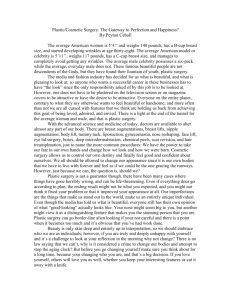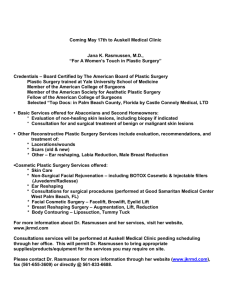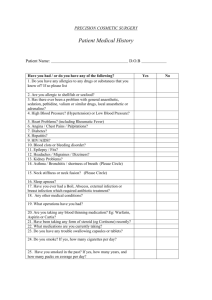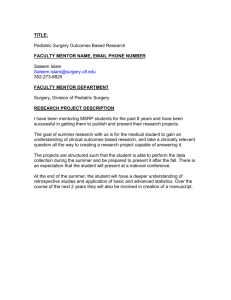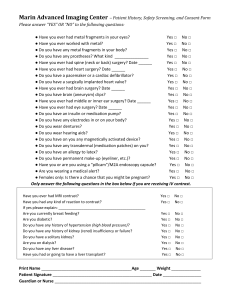Student Student 1 Mr. Seematter Sophomore English 4-23
advertisement
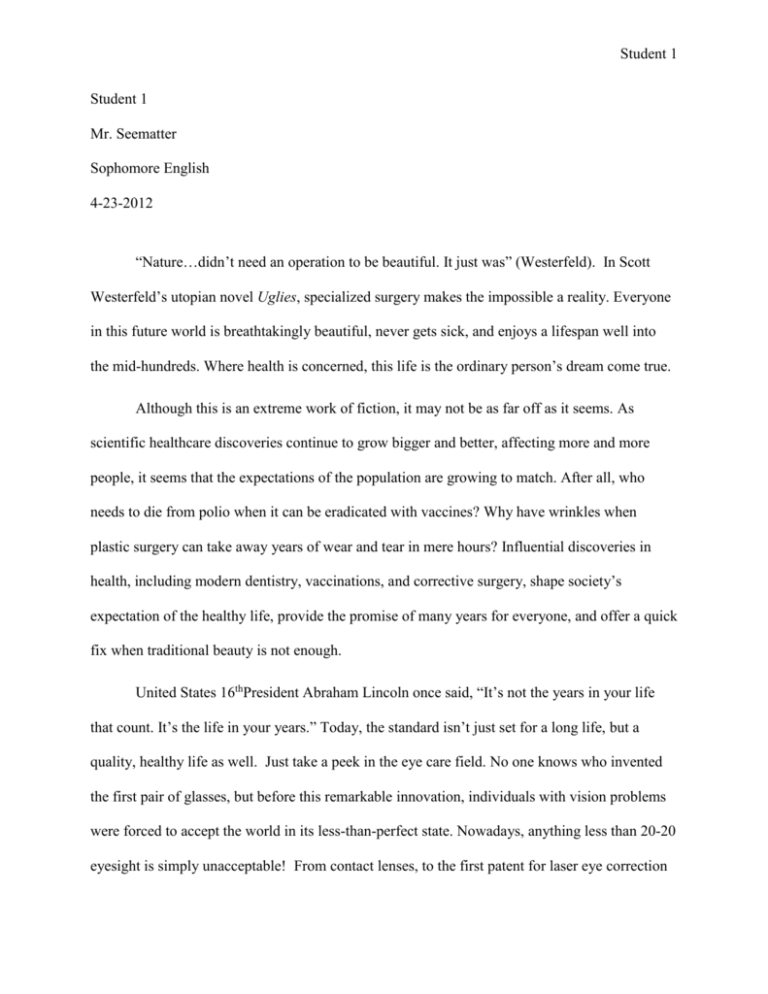
Student 1 Student 1 Mr. Seematter Sophomore English 4-23-2012 “Nature…didn’t need an operation to be beautiful. It just was” (Westerfeld). In Scott Westerfeld’s utopian novel Uglies, specialized surgery makes the impossible a reality. Everyone in this future world is breathtakingly beautiful, never gets sick, and enjoys a lifespan well into the mid-hundreds. Where health is concerned, this life is the ordinary person’s dream come true. Although this is an extreme work of fiction, it may not be as far off as it seems. As scientific healthcare discoveries continue to grow bigger and better, affecting more and more people, it seems that the expectations of the population are growing to match. After all, who needs to die from polio when it can be eradicated with vaccines? Why have wrinkles when plastic surgery can take away years of wear and tear in mere hours? Influential discoveries in health, including modern dentistry, vaccinations, and corrective surgery, shape society’s expectation of the healthy life, provide the promise of many years for everyone, and offer a quick fix when traditional beauty is not enough. United States 16thPresident Abraham Lincoln once said, “It’s not the years in your life that count. It’s the life in your years.” Today, the standard isn’t just set for a long life, but a quality, healthy life as well. Just take a peek in the eye care field. No one knows who invented the first pair of glasses, but before this remarkable innovation, individuals with vision problems were forced to accept the world in its less-than-perfect state. Nowadays, anything less than 20-20 eyesight is simply unacceptable! From contact lenses, to the first patent for laser eye correction Student 2 in 1989, over 150 million Americans now combine to spend a whopping $15 billion on vision correction each year (Webb)! Although vision correction may not make the list of the top ten inventions of all time, its impact is very grossly underestimated. Imagine the number of car accidents that glasses and contacts prevent every day. Imagine how many people would be maneuvering through cities in a semi-fog, and how many students would be hopelessly confused in the classroom. Along with that, modern dentistry has raised the bar by straightening and whitening the teeth of millions. In the past, a beautiful smile was a rare commodity; today, this smile can belong to anyone for just a few thousand dollars. Societal pressures have caused both vision correction and dental correction to become a standard. For instance, children with crooked teeth expect to get braces because this practice is no longer just a luxury. The message is clear: an attractive appearance and healthy life is available to everyone possessing sufficient funds and willing to do a little tweaking. Just how old is the oldest person that you have ever encountered? Chances are, your answer is much higher than it would have been if this question were posed a few hundred years ago. Today, American life expectancy at birth is about 78 years, almost 30 years longer than one century ago (Baker). Years ago, it was common for many women to die in childbirth, for many children to never make it to their teenage years, for people to die from bad water or infectious disease. One of the biggest life-saving improvements is the vaccination, which has come to the rescue by eradicating dangerous diseases of many types. “Whooping cough, the leading cause of death among children in the United States in the 1920s and '30s, claims fewer than 10 lives a year. Diphtheria, which also killed thousands of children each year in the United States as late as 1940, took fewer than 10 lives in the past decade” (Yost). Although these diseases haven’t Student 3 vanished from the world completely, in the United States, their prevalence is very low. Yet as these diseases leave and other health advancements are made, we have to ask ourselves a very important question. Exactly how long should human life be prolonged? Are advancements going to continue until it is common to live into your mid-hundreds? As the medical world brings the population into a “silver tsunami,” these are important prospects to consider. Surgery…by choice? “In 2004, U.S. doctors performed almost 9 million [cosmetic surgery] procedures, including such popular operations as breast augmentations, tummy tucks and liposuction” (Friedman). In this day and age, cosmetic surgery has made it so that there really is no such thing as natural beauty. No one is perfect, but now flaws can be eliminated to create that utopian form of gorgeous. Unfortunately, this recent development can have negative physical and psychological side effects. First, not every person who chooses to undergo plastic surgery comes out safely. Similarly, “the knife” has raised the bar so high that people think these surgeries are necessary if they ever want to be considered nice-looking. On the other hand, plastic surgeries, such as the well-known gastric bypass, instantly fix weight problems that could otherwise be changed with some perseverance, including a healthy diet and exercise. Whether it is defining beautiful or taking responsibility for other issues, plastic surgery shapes more than our bodies—it shapes our view of the ideal too. So what is utopia to you? My vision of that perfect world absolutely encompasses each new discovery where health is concerned, although no one knows if that is a good thing or a bad thing just yet. These scientific discoveries are coming very quickly, and our expectations about quality of life, length of life, and beauty are changing to match. The standard for health is now set and perhaps these expectations will allow our “utopia” to become everything desirable. As Edith Evans says, “I can’t imagine going on when there are no more expectations.” Dream on Student 4 about that perfect body, but remember just how far health has come. Because on the road to utopia, health is speeding along. Student 5 Works Cited Baker, Beth. “Prolonging Life.” CQ Researcher. Web. 5 April 2012. Friedman, Jane. “Cosmetic Surgery: Are Tougher Safety Regulations Needed?” CQ Researcher. Web. 5 April 2012. Webb, Jennifer A. “Lenses, Frames, and Low Vision: Vision Care Has Come a Long Way.” Academic Search Premier. Web. 28 March 2012. Westerfeld, Scott. Uglies. New York: Simon Pulse, 2005. Yost, Kenneth. “Childhood Immunizations: Why Haven’t Millions of Youngsters Gotten All Their Shots?” CQ Researcher. Web. 6 April 2012.
